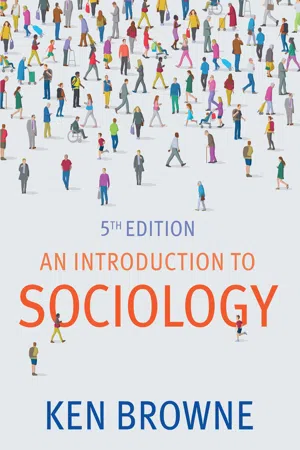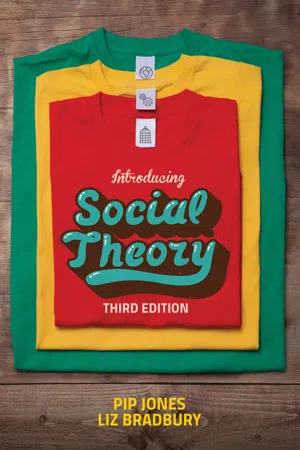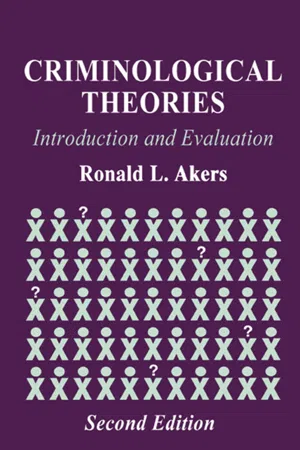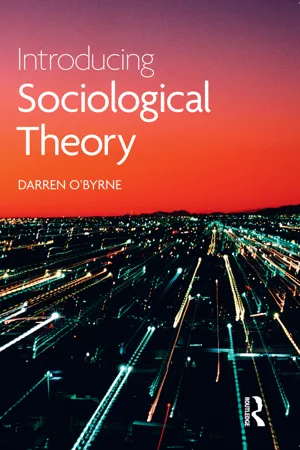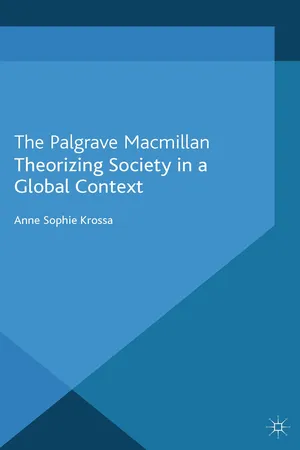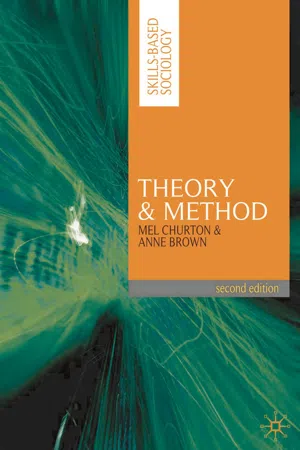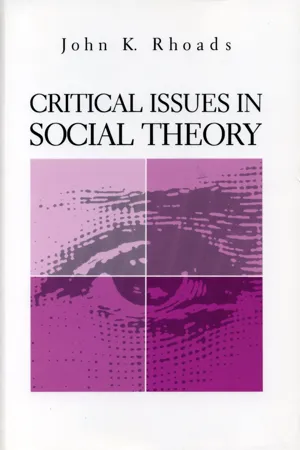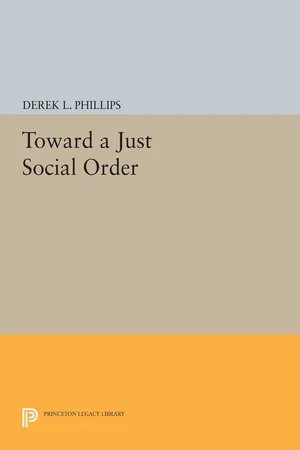Social Sciences
Consensus vs Conflict Theory
Consensus theory posits that society is held together by shared values and norms, emphasizing cooperation and stability. Conflict theory, on the other hand, views society as characterized by inequality and power struggles, with different groups competing for resources and influence. These theories offer contrasting perspectives on the nature of social order and change.
Written by Perlego with AI-assistance
Related key terms
1 of 5
10 Key excerpts on "Consensus vs Conflict Theory"
- eBook - ePub
- Ken Browne(Author)
- 2019(Publication Date)
- Polity(Publisher)
Functionalism A sociological perspective which sees society as made up of parts – such as the family, education system and religion – which work together to maintain society as a whole. Society is seen as basically harmonious and stable, because of the agreement on basic values (value consensus) established through socialization.Consensus theorists, when studying society, emphasize these shared norms and shared values that exist between people, and see society made up of individuals and social institutions working together in harmony, without much conflict between individuals and groups.Conflict theory
Conflict theoryemphasizes that social order is maintained by coercion and power, with power in the hands of those with the greatest political, economic and social resources. Conflict theory has its origins in the work of Karl Marx (1818–83) and Max Weber (1864–1920), and is found in the work offeministwriters.Conflict theory A sociological approach that emphasizes social differences and conflicts, with inequalities in wealth, power and status all creating conflicts between individuals and groups.Feminist Someone who believes that women are disadvantaged in society, and should have rights, power and status equal to those of men.Rather than viewing society as essentially peaceful, harmonious and based on value consensus, as consensus theorists do, conflict theorists emphasize social differences and conflicts between individuals, groups and classes. They emphasize conflicts created by inequalities in wealth, power and status when describing and explaining society, as individuals and groups struggle against one another, pursuing different interests. Conflict theory is associated with Marxist, Weberian and feminist theories (see pages 53 –9 ). Conflicts exist, for example, between White British people and BAME groups, between men and women, between the rich and the poor, between employers and employees, between different religious groups (e.g. Christians and Muslims), and between different age groups (e.g. younger and older people). Figure 2.3 - eBook - ePub
- Pip Jones, Liz Bradbury(Authors)
- 2017(Publication Date)
- Polity(Publisher)
is a consensus about such things. However, it is not the kind of consensus portrayed by the consensus theorist. It is a consensus that is managed by those who believe they benefit from the subordinate position of women in society, and one that is intended to make it harder for those who do not benefit from successfully opposing the status quo.Conflict theory: conclusion
There are a number of sociological theories that can be called structuralconflict theories, in that they are based on two main premises:- social structures consist of unequally advantaged groups; the interests of these groups are in conflict, since inequality results from the domination and exploitation of the disadvantaged groups by the advantaged ones
- social order in such societies is maintained by force – either by actual force, or by force exercised through socialization.
Consensus theory versus conflict theory
Structural-consensus theory and structural-conflict theory emphasize different kinds of influences on thought and behaviour. Though both theories see the origin of human social life in structural influences or determinants of society external to the individual, they disagree about what this outside society consists of. Consensus theory emphasizes the primacy of the influence of culture – what we learn to want as a result of socialization. Conflict theory, in contrast, pays most attention to the conflict inherent in the relationship between unequally advantaged groups in society and argues that the content of culture should be seen as a means of perpetuating relationships of inequality.Society as the creation of its members
The influence of interpretation on behaviour
A third kind of sociological theory leads in a rather different direction. It still attempts to explain why human beings in society behave in the orderly ways they do, but instead of looking for the answer in the influence of a social structure which people confront and are constrained by, this theory argues something else. From this point of view, the most important influence on an individual’s behaviour is the behaviour of other individuals towards him or her. The focus is not on general cultural rules, or on the unequal distribution of advantage in whole societies. It is on the way individual social encounters work – on how the parties to them are able to understand and thereby interact with one another. This is not to say that structural theories do not try to explain this, too. In consensus theory, for example, people are role players, and act out parts learned through socialization. But how do they decide which roles to play, in which social setting? Consensus theory does not try to explain why people choose one role rather than another. It is assumed that we somehow learn to make the right choices. This third theory, however, argues that the choice of role-playing is much more complex than in this rather mechanical view. It argues that the essence of social life lies in the quite extraordinary ability of humans to work out what is going on around them – their ability to attach meaning to reality – and then to choose to act in a particular way in the light of this interpretation. This is called interpretive, or action theory - eBook - ePub
Criminological Theories
Introduction and Evaluation
- Ronald L. Akers(Author)
- 2013(Publication Date)
- Routledge(Publisher)
Chapter 8 Conflict Theory DOI: 10.4324/9781315062723-8Introduction
Conflict theory begins with the assumption that society is not held together by agreement and consensus on major values but rather is:[A] congeries of groups held together in a dynamic equilibrium of opposing group interests and efforts. The continuity of group interactions, the endless series of moves and countermoves, of checks and cross-checks…in an immediate and dynamically maintained equilibrium…provides opportunity for a continuous possibility of shifting positions, of gaining or losing status, with the consequent need to maintain an alert defense of ones positions…. Conflict is viewed, therefore, as one of the principal and essential social processes upon which the continuing on-going society depends. (Vold, 1958 :204)Power is the principal determinant of the outcome of this conflict. The most powerful groups control the law, so that their values are adopted as the legal standards for behavior. The members of less powerful groups, though they suffer legislative and judicial defeats, continue to act in accordance with their internal group norms, which means violating the law. Thus, conflict theory offers both an explanation of law and criminal justice and an explanation of criminal and deviant behavior. In the first part of this chapter, conflict theory is contrasted with consensus/functionalist theory as an explanation of law and criminal justice. In the second part, the theory that crime is produced by group and culture conflict is presented and evaluated.Law Is a Type of Social Control
Social control consists of a normative system with rules about the way people should and should not behave, and a system of formal and informal mechanisms used to control deviation from, and promote conformity to, these rules. Informal social control exists in the family, friendship groups, churches, neighborhoods, and other groups in the community. Formal social control includes law and the criminal justice system, in which the rules are officially promulgated and enforced by legally authorized agents. - eBook - ePub
- Darren O'Byrne(Author)
- 2013(Publication Date)
- Routledge(Publisher)
Conflict theoryIn this chapter we will be:- introducing the theory known as ‘conflict theory’ and seeing how it relates to the functionalist perspective we covered in Chapter 2 ;
- tracing the origins of this approach in the idea of ‘cultural relativism’;
- defining ‘interest groups’ and showing how they are central to the way conflict theorists see the world;
- discussing how conflict theorists present a relativist theory of social change in the form of a new ‘historical sociology’.
Conflict and consensus
One of the fundamental features of any sociological perspective is how it defines the ‘natural’ state of a society. Are societies inherently stable, held together by a consensus of shared values – which sometimes people lose sight of – and by smoothly integrated institutions – which sometimes malfunction? Or are they actually defined by competition and difference, occupied by a vast array of groups and communities with diverse cultures, values and interests, some of which are incompatible with one another?Functionalists, who we discussed in the previous chapter, clearly subscribe to the former position. They begin, following Durkheim, with the assumption that there is a shared value system underpinning society, and that this forms part of the same project that binds together all the institutions within that society, a benign process of social reproduction and evolution. Disagreements, conflicts, violence – these are all the result of malfunctions, and malfunctions, like diseases, can be cured. Thus, the delinquent wants to follow the same goals as everyone else, but for some reason she or he has been denied the opportunity, and so goes down a different route. This is not the route she or he wants to follow, but rather has - eBook - PDF
- P. Bishop, A. Hines(Authors)
- 2012(Publication Date)
- Palgrave Macmillan(Publisher)
But they are also part of the same culture, to some extent at least. And even many of the groups themselves promote a “we” that may be more cooperative than collaborative. Successful organizations or teams, for a time at least, use a high degree of collaboration as a way to succeed. So if one believes that the divisions within society dominate, then he or she is a Conflict theorist. If one believes the similar and cooperative elements are more important, then not. Market Theory Conflict Theory is a third type of theory called a Mechanism theory. It is not a Shape theory because the direction that conflict takes, whether directional or cyclic, is unclear. It is not a driver because it is not a specific thing. Rather it is a state of being Market Theory assumptions 1. There is no limit to what humans want. 2. Conflict and competition are the over- riding motivations for human action. 3. The production of goods and services is the most important mission of society and its economy. 4. Capital investment is the best mecha- nism for continued progress in the future. 136 Teaching about the Future (in conflict) that produces behaviors that create social change. But there are specific drivers of this mechanism just as there are specific drivers of Progress and Development. Cycle Theory challenged the assumption that progress and develop- ment can go on forever and Conflict Theory challenged the assumption that society itself is a unitary entity. One form of conflict is even cele- brated as the engine of progress over the last few centuries – economic competition in free markets, better known as capitalism. Trading has been found in almost all societies, going back to the beginning of tool making. But only in the last few hundred years has economic competition (or conflict in the marketplace) become so important in creating social change. The economies of the past were tribal in which most goods were obtained and shared in common. - eBook - ePub
Toward a Unified Criminology
Integrating Assumptions about Crime, People and Society
- Robert Agnew(Author)
- 2011(Publication Date)
- NYU Press(Publisher)
There is much less research on the causes of crime beyond core crimes. But limited data suggest that the arguments of critical theorists have some merit. Take, for example, corporate crimes. Data suggest that the social power possessed by corporate officials reduces the likelihood such crimes will be criminalized or subject to serious sanction, thereby contributing to their commission. Corporate crimes often result when corporate officials feel threatened; for example, they are more likely among corporations facing financial problems, including the inability to meet financial goals and the loss or threatened loss of financial resources. Also, corporate officials sometimes form subcultures that minimize, justify, or excuse the harm caused by corporate crimes (see Agnew et al., 2009; Cullen and Agnew, 2011; Lynch and Michalowski, 2006).Summary
In sum, there is evidence for the existence of both consensus and group conflict, with the degree of consensus/conflict depending on such things as the groups in question, the issue or domain being examined, the society, and the time period. Related to this, there is some support for the explanations of crime offered by both consensus and critical theorists, although most research has focused on core crimes. These conclusions may strike many as self-evident. Even a causal examination of the world reveals evidence of both consensus and conflict, and certain criminologists have come to advocate a compromise between the consensus and conflict perspectives (see Akers and Sellers, 2008; Bernard, 1983). Nevertheless, the research highlights the need for an integrated consensus/conflict theory and begins to suggest the nature of such a theory. It is beyond the scope of this chapter to develop such a theory, but in the next section I describe the issues an integrated consensus/conflict theory should address and provide some direction about how to proceed when constructing such a theory. - eBook - ePub
- A. Krossa(Author)
- 2012(Publication Date)
- Palgrave Macmillan(Publisher)
Conflict also essentially entails both aspects in varying proportions, making it a particularly useful instrument for analyzing society theoretically as well as empirically. In this sense, society is understood as potentially constituting the space on an imagined continuum between the two extreme manifestations of conflict: either total war or total concordance. In between these extremes, both conflict and society potentially take on a broad range of forms and expressions. 1 By implication it would be a misunderstanding to imagine conflict as only taking two forms: either divergence or consensus. Only by acknowledging that there is a continuum and that the Part in between its extremes, however broad, is the theoretically most relevant space one can equip the term with analytic instrumentality. All this space between the extremes is accordingly characterized by a combination of homogeneity and heterogeneity, in varying proportions, and can be interpreted as depicting manifestations of society. The theoretical implication here is that conflict and society are structurally inseparable: “[i]t is impossible to perceive the meaning of a conflict in a specific manifestation, i.e. its function, which consequences have to be faced, how to deal with it meaningfully etc., without a simultaneous analysis of subjacent social structures and processes” (Buehl 1972, 35; trans. A.S.K.). This argument gains further relevance when inverted: understanding and interpreting society without systematically taking into account conflict misses the point, both theoretically in principle, as laid out here, and empirically with respect to analyzing the state of meta- as well as meso- and micro-conflicts and their meanings for societal conditions and forms. If we accept and apply conflict according to this interpretation, we are faced with an ambivalent element - eBook - PDF
- Mel Churton, Anne Brown(Authors)
- 2017(Publication Date)
- Red Globe Press(Publisher)
Also, he provides little explanation of how conflict escalates into social change. Exercise 2.9 Copy and complete the table here, using the information you have read so far K U in this chapter. A A society based on conflict? Main theories Marxist Neo-Marxist Critical theory Conflict theory Key writers Basic assumptions of theory Strengths Limitations 34 Theory and Method Post-Marxism Since the collapse of the former USSR and the Eastern Bloc communist regimes and the introduction of free-market policies in these countries Marxist the-ories could be seen as somewhat redundant (Best et al. 2000). The move to introduce Western-style democratic governments in these countries and some in the Middle East has added weight to this general demise of Marxist thought. Furthermore there seems to have been a decline in the working class, especially manual workers, as the class system generally has become more frag-mented and class positions have become increasingly difficult to locate within a Marxist class structure. Socialism as a political force also seems to have been abandoned by left-wing parties in European countries in an attempt to address the modern social and political changes taking place in relation to the position of the individual and their place in society. Commentators have pointed to the policies of Labour governments in the 1990s and 2000s in the UK largely continuing in the same mould as the former Conservative policies, as a case in point. A SOCIETY BASED ON CONSENSUS Sociologists who base their theories of society on the notion of consensus take their starting-point as what appears to be the obvious agreement that must exist in society if it runs smoothly and people generally obey rules, have similar attitudes and values. At least superficially it would appear that the foundations of society are built upon the common and accepted ways of going about organizing the way we live. - eBook - PDF
- John Kenneth Rhoads(Author)
- 1991(Publication Date)
- Penn State University Press(Publisher)
Norms define the limits of tolerance and restrict dissent so as to further the cause.136 While the clarification of its values furthers pattern-main- tenance, the clarification of its norms and the suppression of dissent contribute to integration. Coser's propositions derived from Simmel weaken the dichotomy thought by some to obtain between functionally sustained order and conflict destructive of order. Not all conflict is dysfunctional, and some conflicts have precisely the consequences of building up the internal order of collectivities, strengthening them, and integrating hitherto unrelated collectivities. In the light of Simmel and Coser, consensus and conflict progress from strict antithesis to partially overlapping factors in regard to their effects. The Issue Reconsidered: Power and Authority Let us address the consensus-conflict controversy by revising the bound- aries between functionalism and conflict theory, for any theory can be legitimately criticized if it illegitimately extends the explanatory power of the dimensions it abstracts from reality and legislates false explanations as a result. The concepts of authority and power delineate such boundaries. In the context of preceding discussions, by authority is meant compliance motivated by duty, the source of authority being experienced as legiti- Conflict 301 mate. This we have already seen. In contrast, by power is meant the mobilization of resources to impose one's will against resistance, compli- ance by the weaker with the will of the stronger, which is not experienced as legitimate by the weaker. We put forth a dual contention: (1) Conflict theory exaggerates the role of power and minimizes the role of authority; (2) functionalism exaggerates the role of authority and minimizes the role of power. The former mistakenly extends the scope of power, whereas the latter mistakenly extends the scope of authority. - eBook - PDF
- Derek L. Phillips(Author)
- 2014(Publication Date)
- Princeton University Press(Publisher)
That is not to say, of course, that I share all of their views. Insofar as their ex- planatory views are concerned, as I noted earlier, they are unable to satisfactorily account for social conflict. And certainly they ex- aggerate the extent to which people actually are guided by inter- nalized normative standards. Further, I believe that the consensus theorists do—as the private interests theorists and situational an- alysts point out—underestimate the extent to which people are frequently guided by self-interests and situational demands and expectations. My principal source of disagreement with the consensus theo- rists, as should by now be apparent, is their treatment of normative and moral considerations. In their view, anything that threatens social order is seen as deviant or dysfunctional, as properly re- quiring improved modes of socialization and/or increased social control to restore the social system to the state of social order ("equilibrium") that it requires. They do, then, make a strong nor- mative commitment: Whatever promotes social order is good. The appropriate moral standards or values are whatever will, in the given circumstances, achieve the greatest degree of social order. However, the consensus theorists never consider the possibility of rationally justifying those dominant moral standards and values. But, of course, they should not be expected to. In common with other social scientists, they reject the possibility of ever providing such a rational justification. For that reason, the correctness of value-judgments cannot be demonstrated and evaluations must always be avoided. Since I am in complete disagreement with this point of view, I now must indicate why I think it is wrong. Let us, then, consider the issue of value-judgments in somewhat more detail.
Index pages curate the most relevant extracts from our library of academic textbooks. They’ve been created using an in-house natural language model (NLM), each adding context and meaning to key research topics.
